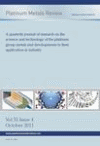-
oa Resin-Supported Palladium Complexes for Catalyses in Water
- Source: Platinum Metals Review, Volume 47, Issue 2, Apr 2003, p. 60 - 60
-
- 01 Jan 2003
Preview this article:






Resin-Supported Palladium Complexes for Catalyses in Water, Page 1 of 1
< Previous page Next page > /docserver/preview/fulltext/pmr/47/2/pmr0047-0060a-1.gif
There is no abstract available.
© Johnson Matthey


